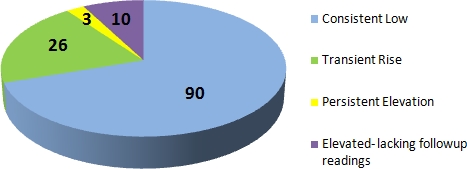Evanescent Antibodies: A Report on the Natural History of Anti-Blood Group A2 Antibodies and Their Rapid Resolution in Patients Awaiting A2 to B Transplantation
Medstar Georgetown Transplant Institute, Medstar Georgetown University Hospital, Washington, DC.
Meeting: 2018 American Transplant Congress
Abstract number: B87
Keywords: Immunoglobulins (Ig), Kidney transplantation, Sensitization
Session Information
Session Name: Poster Session B: Kidney Deceased Donor Allocation
Session Type: Poster Session
Date: Sunday, June 3, 2018
Session Time: 6:00pm-7:00pm
 Presentation Time: 6:00pm-7:00pm
Presentation Time: 6:00pm-7:00pm
Location: Hall 4EF
Introduction: Despite the benefits of A2 to B transplants, centers have been reluctant to adopt such a program due to unanswered questions including whether elevation of anti-blood group antibodies are transient or persist. We prospectively collected data on A2 levels over time for our blood group B patients to assess the natural history of such antibodies.
Methods: In addition to available historic measurements, we initiated a protocol for measurement of quarterly anti-A2 titers of our B waitlist starting in October 2016. Low titers were defined as ≤ 1:8. An increase in titers was defined as a 2-fold rise in titer that reached a level of at least 1:8. Decreasing titers were similarly defined by a 2-fold reduction. If a an anti-A2 titer was >1:8 at any given measurement a repeat titer was done in 30 days in addition to 90-day repeat to assess the rapidity of resolution.
Results: We collected a total of 661 anti-A2 samples on 189 patients. There were 124 adults who had at least three recorded anti-A2 levels (range 3-8 measurements) and were included in this analysis. The measurement period ranged from 12 to 44 months of surveillance with 65% of the results occurring within the one year of serial measurements protocol. 72.6% of patients (n=90) had persistently low titers. The remaining 34 patients had a total of 39 increases in titer during the measurement period. Only 3 elevations of titer (8%) were persistent. 10 more (26%) occurred on the most recent measurement and so the final outcome is not yet known. The remaining 26 (67%) reflected only transient rises which returned to baseline. In only 3 of these cases did titers remain elevated for more than 3 months.
Conclusion: The majority of high titer measurements that may make a patient ineligible for an A2-to-B transplant are transient. Excluding all patients with even transient rises in anti-A2 titers may cost 10-15% of blood group B patients a chance to receive a kidney more rapidly by utilizing an A2 donor.
CITATION INFORMATION: Radomski S., Rosen-Bronson S., Li D., Awwad M., Vranic G., Javaid B., Abrams P., Yi S., Cooper M., Gilbert A. Evanescent Antibodies: A Report on the Natural History of Anti-Blood Group A2 Antibodies and Their Rapid Resolution in Patients Awaiting A2 to B Transplantation Am J Transplant. 2017;17 (suppl 3).
To cite this abstract in AMA style:
Radomski S, Rosen-Bronson S, Li D, Awwad M, Vranic G, Javaid B, Abrams P, Yi S, Cooper M, Gilbert A. Evanescent Antibodies: A Report on the Natural History of Anti-Blood Group A2 Antibodies and Their Rapid Resolution in Patients Awaiting A2 to B Transplantation [abstract]. https://atcmeetingabstracts.com/abstract/evanescent-antibodies-a-report-on-the-natural-history-of-anti-blood-group-a2-antibodies-and-their-rapid-resolution-in-patients-awaiting-a2-to-b-transplantation/. Accessed February 24, 2026.« Back to 2018 American Transplant Congress

